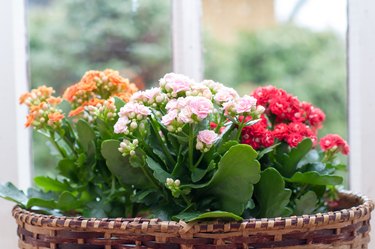
If you have furry family members, choosing houseplants isn't as simple as finding one that looks pretty or matches the amount of sunlight your home gets. Many indoor plants are toxic to cats. Yes, kalanchoe (Kalanchoe spp.) is toxic to both cats and dogs. If you already have this plant, which goes by other names, including mother-in-law plant and mother of millions, knowing the signs of ingestion is important.
Basics of Kalanchoe
Video of the Day
Popular as an indoor plant, kalanchoe is a flowering plant that's relatively low maintenance. The plentiful, tiny blooms on these plants can be red, pink, magenta, yellow, white, or orange, making them a bright addition to a sunny spot in your home. There are many types of kalanchoes available, but these succulents typically have thick, waxy leaves displaying scalloped edges.
Video of the Day
Symptoms of Ingestion in Cats
Kalanchoe is considered mildly toxic to cats and dogs. The toxicity in kalanchoe plants comes from bufadienolides, which is a cardiac toxin. The most common signs if your cat or dog nibbles on the plant are gastrointestinal, including vomiting and diarrhea. Ingesting large amounts of a kalanchoe plant could cause an abnormal heart rhythm or rate, although this side effect is rare. Your pet could also become weak or collapse after eating large amounts of kalanchoe.
How to Respond to Ingestion
If your curious cat takes a sample of your kalanchoe and shows signs of sickness, remove the plant from your pet's mouth if they didn't swallow it yet. Keep the part of the plant in case you need to take your cat to the vet so you can have a sample of the plant they ate. Even if your pet doesn't show symptoms immediately, keep an eye on them to watch for a delayed reaction.
Call your vet immediately for guidance. Your vet can determine if you need to bring your cat in for veterinary care. You can also call the ASPCA Animal Poison Control Center at 888-426-4435 or the Pet Poison Helpline at 855-764-7664, both of which are available 24 hours a day, seven days a week. These services typically charge a fee for their help in handling your pet's situation.
Keeping Your Cat Safe
It's a good idea to check all of your houseplants to see if they're safe for your pets. If you want to eliminate all risk of sickness, getting rid of the toxic houseplants is necessary. Replace them with plants that aren't toxic to cats, including Boston fern (Nephrolepis exalta bostoniensis), burro's tail (Sedum morganianum), or polka dot plant (Hypoestes phyllostachya).
If you want to keep your plants, place them where they're difficult for your pets to reach. This can be challenging with cats, as they tend to climb or jump their way to nearly any height in your home. Offer your pet lots of toys, a cat tree, or other stimulating activities that keep them busy to discourage them from messing with your plants. You can also grow plants that your cat can eat, like catnip (Nepeta cataria) or wheatgrass (Triticum aestivum), and place them in an easily accessible place to keep your cat from eating your kalanchoe.